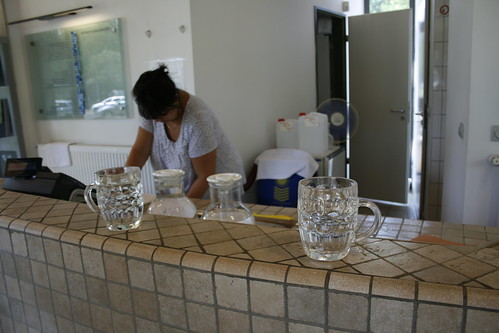
A lady working at Széchenyi baths lets us taste the mineral spring waters.
Our goal was to try as many of the spas (or bath houses) as we could in our 3 short days there. The interesting history about Budapest's bath houses is that many are very very very old, dating from the Turkish times (1541–1686 during Ottoman rule). The bath houses that have the Turkish style resemble domes, with the main bath under the dome. Some dry or wet saunas encircle the main hot bath under the dome, and cold or even hotter tubs also encircle it. But in the Turkish style bath house, the dome was the center of attraction. The inside of the bath house was kept dark and dim, and sometimes the dome has holes punched into it so that it resembles a starry sky when you look up. The rays of light beaming through the holes also make a cool laser effect when the beams hit the steamy air inside the bath house.
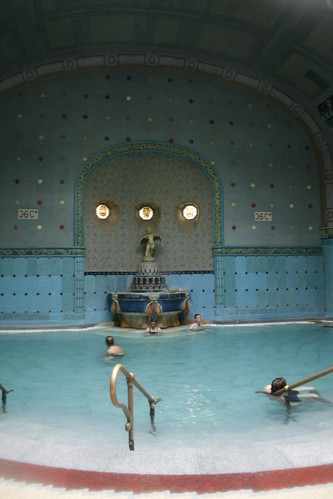
Inside the pool rooms at Gellert Baths.
We went to one of the Turkish style bath houses the first night for the night swim. It was called Rudas and was originally built in 1550. As it was dark, we didn't get any pictures. But it was super relaxing and we were so excited to be there, it didn't matter that we stayed until about 2am. We weren't tired! We went that night because the late night bath time was co-ed. Normally, the bath houses separate genders. One day, only women can go. The next day, only men can go. Turkish bath houses were normally for men only, back during the Ottoman rule. Women just weren't allowed. Good thing we now live in modern times, otherwise I wouldn't be able to go!
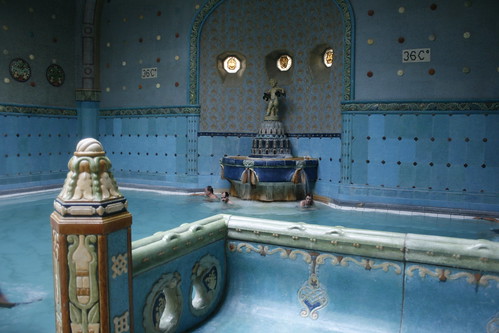
The Gellert Baths.
The rest of the bath houses are more modern. The funny thing is, when the political situation changed, and the Turks were no longer such a prominent influence on the culture, the Turkish bath houses went into ruin. They just started rotting and nobody gave a damn. Well, sometime in the late 1800s and early 1900s, there was a revival of spas and cleanliness, and bathing started anew! However, the culture had a different style, more extravagant and flashy. Some of the Turkish bath houses, which were very simple in style, were restored. But new ones were built over the old Turkish ones too, and they reflected the modern style. This is when Gellert Baths were built. Comparably, it was very ornate and had such detailed and beautiful ceramic tile work. The style was Art Nouveau, MY FAVORITE!!!!!
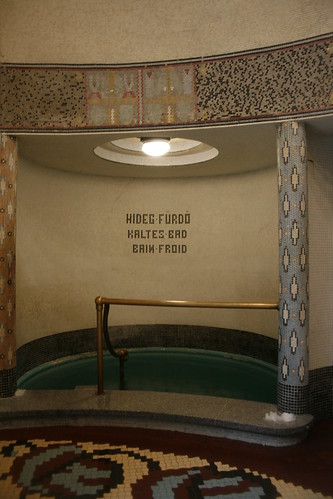
The cold dipping pool at Gellert Baths.
The Gellert bath house was gigantic! It had a men's and a women's side. The day we decided to go (strategically) was when they had the co-ed bathing. Both men and women on that day could go into the men's and women's pools. I must say, the men's pools were much better looking. Structurally, they were the same, but the decoration and stuff was better looking. The women's pools were just kind of blah (comparatively). These baths were also popular with the tourists. We had to wait almost an hour to get into the pools. The staff only lets in a maximum amount of people in at one time. They don't want to over crowd the pools. So if 3 people go out, they let 3 people in. That's why we waited so long. But once we got in, we spent the whole afternoon there, until closing time (for the public).
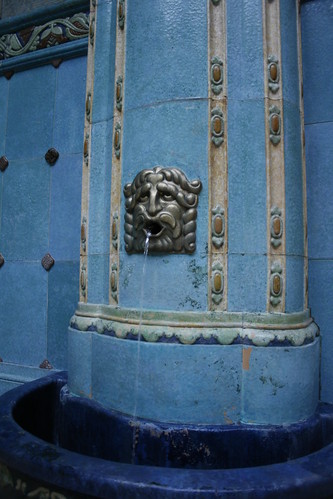
An old man spits out cold drinking water, to quench thirst.
The last bath house we visited on our 3rd day was called Kiraly, and it was an old Turkish bath. It was kind of hard to find, out of the way of the typical tourist route. While we were waiting in line to get in, we noticed a big difference in the clientele. A lot more regular folk, locals, but a few tourists mixed in. The price was the cheapest too! Being a Turksih bath, it had a predictable arrangement on the inside, so it was already familiar after going to Rudas. I think I liked the Turkish baths the best. They just focused on the hot water, and had a more simplistic but stylistic vibe. You could really relax in the dim light and geometrical patterns all around.
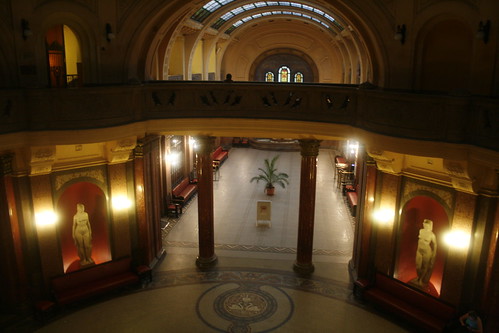
The main hall at Gellert Baths.
Kiraly also had a mini museum when you got out of the baths. It also had a middle open outside section. It reminded me of the old hospitals or sanitariums. But it was nice to take a nap outside and hear the birds singing, even though you were in the middle of a city. There were a few weirdo tourists there, doing funny stuff. It all added to the entertainment. We went to so many hot springs that we never took a shower in our hostel while we stayed in Budapest!

0 comments:
Post a Comment